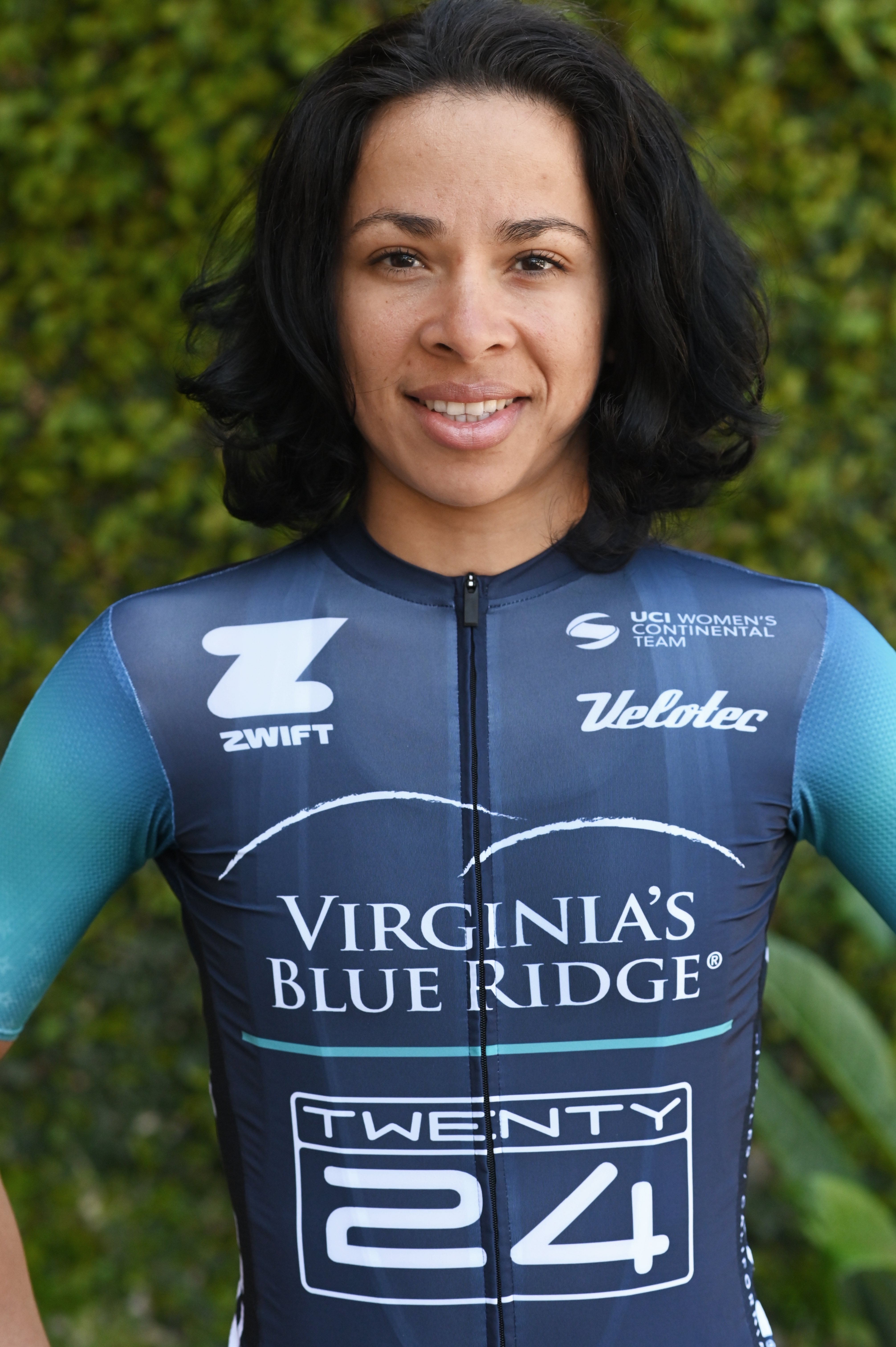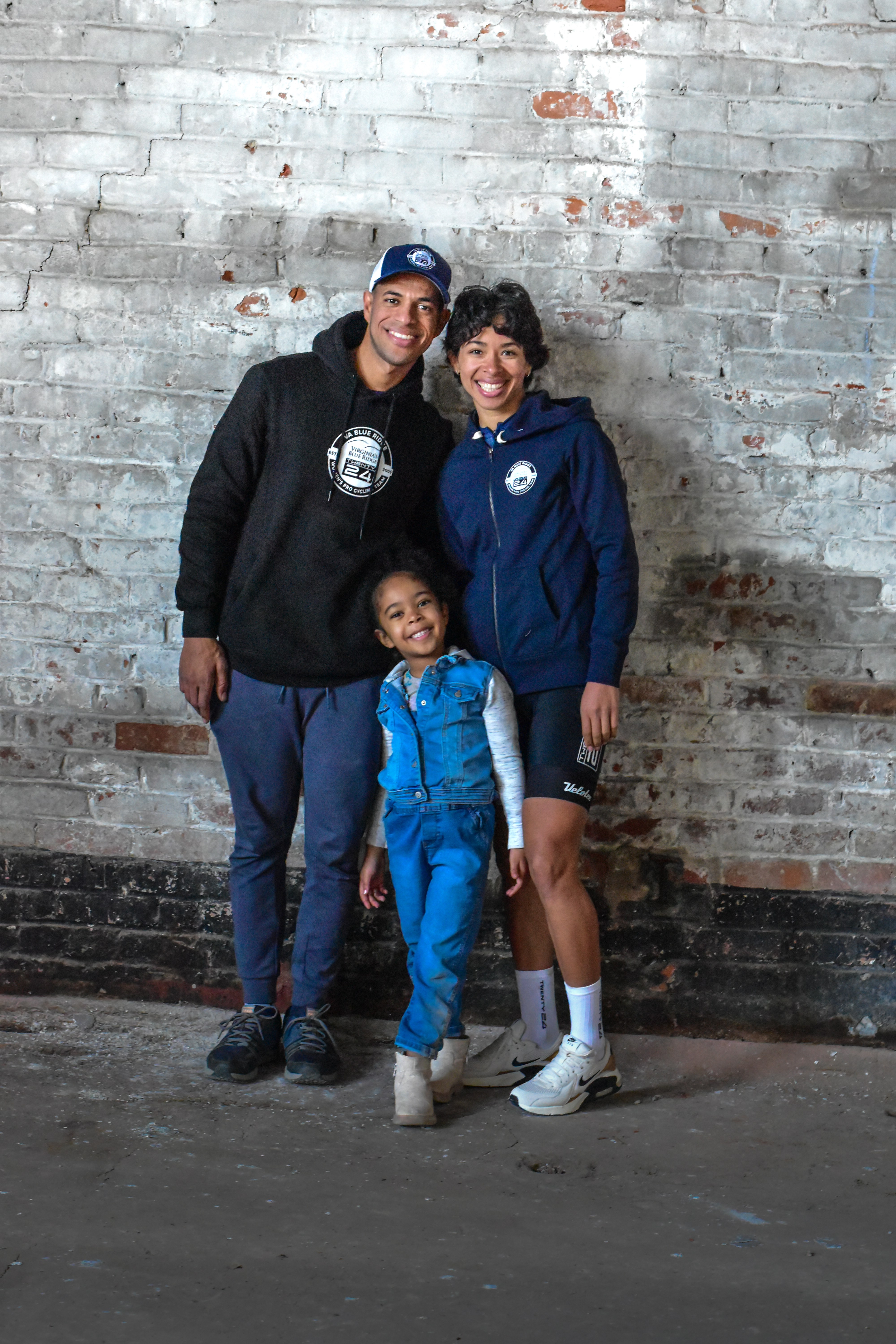Marlies Mejia Garcia’s morning routine looks familiar. Breakfast for her 4-year-old daughter Marieth. Check the weather and prepare accordingly for the day ahead. Take Marieth to preschool in Roanoke. Head to work.
At this point, the routine of the Cuban native starts to look a little different. Garcia is a professional bicyclist, and the majority of her job involves training rides. Most days she grabs some training fuel and heads up to the traffic-free solitude of the Blue Ridge Parkway for a four-hour solo effort. Rain or shine, cold or heat, she’s on the bike.

She trains and races for Virginia’s Blue Ridge Team24, an all-female team based in Roanoke. The 24 designation refers to the 2024 Paris Olympics. Pro cyclists follow a predictable annual race calendar filled with local, national and international competition, but every fourth year, the Olympic year, is heightened. For many cyclists, including Garcia, representing their country in Paris will be the apex of their career.
Garcia races with great pride for Cuba, and a trip to Paris in July would be her third Olympics. She competed in London in 2012 and Rio in 2016 in the omnium, a frenetic multi-race event held on a banked indoor track that is somewhat analogous to the decathlon in track and field.
“Marlies is a superstar in Cuba,” said her team manager, Nicola Cranmer. “She is the best cyclist in the country.”
“Our Canadian athletes referred to her as The Legend,” said Cranmer, reflecting on how Garcia was recruited to the team. “She was on terrible equipment with a loose speedsuit and was a phenomenal athlete, but didn’t have the support system.”
Garcia left Cuba for the Dominican Republic in 2017. Social and economic conditions in Cuba were deteriorating and she had an opportunity to join a professional cycling team that would provide a support system. Although Cuba is a communist regime, immigration reforms established in 2013 allow most Cuban nationals to leave if they are in good standing with the government.
“It was difficult to make the decision to leave the country,” she said, speaking through a translator. “But now, the economic situation in Cuba is more difficult. No electricity. There’s no food. No gas. It’s complicated.”
“Our president makes bad decisions. All the time,” she said.

It’s a bold statement for a Cuban national to make. Athletes and their families are faced with the threat of retribution by the government for speaking out publicly. Garcia speaks like she races: with clear eyes and a fierce resolve.
“She doesn’t misspeak about Cuba,” Cranmer said. “She is in good standing with them.”
“Two years ago, Cuba changed their money,” Garcia said. “We had the Cuban peso and Cuban dollar. They changed their money to American dollars, and Cuban people don’t have American dollars.
“They opened stores with American money even though Cuban people didn’t have American money. It was for when American tourists would visit,” she said.
Many food staples are not available in Cuba but there are emerging entrepreneurial markets, based in Miami, to buy and ship food to Cuban residents. Some of these are private companies supported by the Cuban government. Some are black market entities.
“I buy food here and send it to my family, twice a month,” she said. “I buy online. Everyone buys black market. Cubans travel to Mexico or the Dominican Republic to buy bread. They go and buy stuff in Mexico and they can sell it for money. People travel here [to the U.S.] and buy and sell.”
Communication with her family in Cuba is difficult as well. Internet service is inconsistent. “It’s a government problem,” she said. “Sometimes the government stops the internet because people are selling things online.”
Hundreds of thousands of Cubans have fled the deteriorating conditions in the last two years, and a popular emigration route is the Nicaraguan air bridge. The Nicaraguan government, with cooperation from the Cuban regime, removed travel visa requirements in late 2021. Cubans can buy a plane ticket to Managua, Nicaragua, then pay an entry fee to the government, then pay another fee to traffickers, sometimes referred to as “coyotes.” They’ll be taken to or through Mexico, with the eventual goal of crossing the Rio Grande into the US.
“I have friends that are cyclists that are doing that to come here,” Garcia said, estimating the total cost to be around $3,000.
This type of open immigration policy is sometimes called engineered migration and serves multiple outcomes. For Cuba it acts as a pressure release valve allowing dissidents to leave the country. It also creates a destabilizing force in the target country, in this case the United States, by placing hundreds of thousands of migrants at the Mexico-U.S. border.
About the team
Virginia’s Blue Ridge Team24 is a women’s professional cycling team based in Roanoke, where it creates avenues for athletes to compete at the highest levels with annual world champions and quadrennial Olympians in all cycling disciplines. The team currently has 26 women training in road, track, gravel, mountain and e-sports.
The team moved its operational base from Idaho to Roanoke in 2022 to take advantage of a favorable year-round training climate, many miles of paved and gravel roads with challenging elevation gain, and a supportive endurance sports community.
The team is sponsored by Visit Virginia’s Blue Ridge, the region’s tourism agency.
Garcia’s immigration path has been less dangerous but is still fraught with uncertainty. In July 2022, she and her daughter and her Dominican husband moved to Roanoke with the support of Virginia’s Blue Ridge Team 24. For most of her first 18 months in the U.S. she was unable to travel and race internationally due to her athlete visa restrictions, and she missed several opportunities to gain valuable Olympic qualifying points. She recently obtained a permanent residency green card in the U.S. and can now focus on qualification races on the track in April.
Garcia began cycling at age 12 in her hometown of Santiago de Cuba when she responded to an advertisement by the Cuban National Institute of Sports asking for interested children. She showed elite potential within the first few months and was invited to move to a small cycling school in Artemisia, a 12-hour drive from her hometown. Within a year she won the Cuban Junior National Championships and was promoted to the country’s national cycling academy in Havana, where she was allowed the luxury of training on her own bike. Until then she had shared a single bike with four or five other athletes.
The teenage phenom continued to see success in national and international competitions and placed eighth in the omnium track event at the 2012 London Olympics.
Pro cycling is a unique blend of team and individual effort, and the ratio of the recipe is constantly shifting. The team supports the riders with coaching, training plans, nutritional advice, equipment maintenance, race and travel logistics, and myriad other details. Most VBR Team24 cyclists live and train in scattered locations across the United States and Canada, where they go to school or work to support their cycling careers. Several times a year the team assembles in Southwest Virginia for camps where they ride and train together.
Garcia is in the prime of her professional cycling career at age 31. Cranmer is confident she can remain competitive through the next Olympic cycle and the ’28 Los Angeles games. But Garcia faces more immigration and residency decisions, including whether to continue to compete for her homeland of Cuba or wait two more years to become a U.S. citizen and race for the Stars and Stripes.
Racing for Cuba continues to bring uncertainties.
“I may work hard for a race next month [to race as a Cuban] and Cuba says ‘no,’ because I live here. I’m trying. In the 2024 Olympics I want to race for Cuba if they’ll let me. I love racing for Cuba but they say ‘You live now in the United States,’” she said. “They don’t like it. It’s political.”
Cranmer is optimistic about Garcia’s potential after her racing career concludes, and noted she has a lot of hard-earned experience that can help in recruiting international athletes with immigration and residency concerns.
“She is really good at working on all the immigration stuff. She finds that appealing,” Cranmer said. “She’s really organized and very detail oriented. I see her possibly running this team at some point.” 



